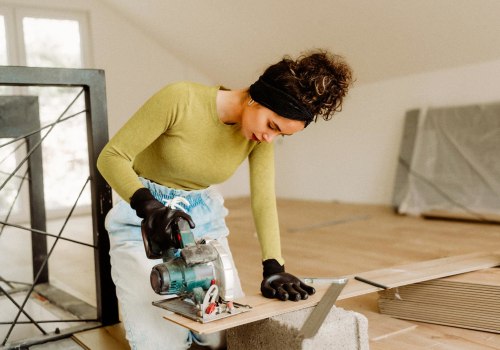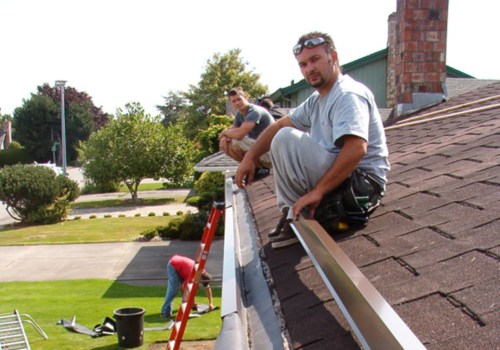How to Start Changing a Home in 7 StepsKnow Your Neighborhood. Before you start, you should spend some time researching the housing market and choosing the right location to invest in. Use the 70% Rule to Plan Your Budget. Decide and buy your house.
The first and best advice is to limit your financial risk and maximize your return potential. In a nutshell, don't pay too much for a home (knowing what it's worth) and make sure you also know how much needed repairs or upgrades will cost before you buy. With that information, you can calculate an ideal purchase price. For your first home exchange offers, start by working with an experienced local real estate agent.
If you decide that you love investing and want to make a living flipping houses, you can always invest the time and money to get your real estate agent license. Use your first fix-and-change project to foster relationships with industry professionals, from investors to realtors and carpenters, whose collaboration and skills you'll need for your next home move. Experienced contractors and agents can connect you with other vendors, give you clues about properties and service providers, and advise you on specific projects. Trusted industry contacts can also help you cover your blind spots and ensure that property estimates and repairs are accurate, saving you time and money.
When it comes to the house-moving process, a few hours of preparation can save you thousands of dollars in the future. From hiring reliable contractors to making financial estimates, you can eliminate most of the risk from your first solution and change with just a little reading and effort. That effort starts here with our overview of how to start moving houses as part of our guide to moving houses. A change of home is when an investor buys a property with the sole intention of rehabilitating and reselling it for a profit.
This is a lucrative investment strategy: there is a chance to make a quick profit and raise immediate capital if the investor selects the right property and stays within budget. Partner with Home Exchange Investors Most of the time, private lenders will serve as the largest source of investor funding. After all, private money lenders are essentially banks, without the endless hurdles they must overcome, most traditional lenders have become synonymous. That said, private lenders are anyone with a few extra dollars in their pocket, a desire to invest, and a propensity to have “folded ears.”.
Perhaps most importantly, they are not associated with a financial institution or a government-backed agency, such as Fannie Mae or Freddie Mac. It's important to make that distinction; it means they can set their own rules. Most private money lenders will require a bit of an insurance policy; or, more specifically, a promissory note and a mortgage or deed of trust on the property in question. Some private lenders will even want borrowers to go a step further and secure the loan with their own assets, but everything is negotiable.
In their simplest form, hard money lenders are loan companies that offer specialized short-term loans backed by real estate. Unlike their private money counterparts, they are affiliated with a company specializing in lending. However, hard money lenders often offer shorter loan terms to avoid confusion with traditional lending institutions. While transactional lenders will offer loans for up to 15 and 30 years, hard money lenders tend to be left with a window of six months to two years.
In addition to their affiliation with a real company, hard money lenders will operate much like private money lenders. Not only are their lending guidelines much more flexible than traditional institutions, but their rates are also slightly higher. Hard money lenders will generally ask for about 11 to 15 percent and about five points (additional percentage fees up front based on loan amount). However, it's worth noting that there are no universal guidelines for hard money lenders; each will come complete with a different set of criteria.
According to experts at New England Home Buyers, “you can finance all home repairs with hard money lenders. Unlike traditional bank loans, hard money loans are not contingent on your creditworthiness. However, fees and interest rates for hard money loans tend to be higher. Keep in mind that interest rates can range between 8% and 15%, and points can range from one to five.
It's also important to note that most hard-money lenders generally only lend a percentage of the purchase price, usually around 70 percent, to be exact. That will require most investors to look elsewhere if they don't want to spend money out of their own pockets, perhaps a private lender. Conventional lenders, such as large banks, judge whether or not to provide loans based on a borrower's ratings, such as credit rating and debt-to-income ratio. Hard money lenders consider the borrower's credit score and income, but they're not as important as they are to banks.
These lenders can be individuals or small businesses, and each will have its own set of loan requirements. Hard money loans are generally based on the real estate investment in question and the strength of the agreement presented to them. They will assess the value after repair (ARV) of the property and the reliability of the rehabber before making the loan. Hard money lenders will finance properties in need of repair that most big lenders won't, but they will also require higher interest rates and less favorable terms than traditional lenders.
Hard money lenders are located all over the country, you need to know how to find them. The easiest way to find them is to search online for hard money lenders in your area. Here you will find results for companies working with hard money loans that you can contact. Attending real estate investor meetings is a great way to network with hard-money lenders looking to work with potential borrowers.
You can also connect with other real estate professionals in your network who have experience working with these lenders or who know of a contact you can contact. Wholesale homes can allow investors to make a lot of money in a short amount of time, making it an excellent vehicle for changing homes. The process involves finding properties for sale, making them under contract, and then assigning the contract to a new buyer. Wholesalers make money based on a percentage of the final sale, which usually ranges from five to ten percent.
The wholesale process doesn't involve buying property, which makes it a great opportunity to get started in real estate without access to finance. Both private and hard money lenders are a great way for investors to swap homes with no money out of their own pockets, but they're not the only ways. An additional way to invest a home without using your own money is to partner with investors who change the house. It's quite possible that teaming up with someone who's already moving houses could be your next best move, and there's no reason they can't provide you with the funding you need.
That said, a partner with money is only as good as a private lender or a hard money lender. Homeowners can also look for a home equity line of credit (HELOC) to purchase rehabilitation property. A HELOC works similar to a credit card, allowing investors to borrow against their capital and make payments every month. These loans will provide investors with a lump sum, offering an excellent start to moving homes.
The best part of this option is that the interest on a HELOC may be tax-deductible in some cases. The best thing to remember when figuring out how to invest cashless homes is that your best chances of receiving funds will be private lenders, hard money lenders, and partners. Each of these three options is made available to investors the day they enter the game. As a real estate investor interested in how to invest homes in New Jersey, you have the security of a demand for local properties.
After all, you need to make sure there's enough demand to keep your home moving business going. The lack of demand for a small business is the reason 42% of small businesses fail to make it. Whether you plan to hire a partner, hire outside contractors, or renovate each property yourself, you'll need to hire a team of qualified people to complete a successful investment. In most cases, you'll only make a few payments, so interest rates have less of an impact on total home change costs than charges.
You should also start building relationships with contractors before buying your first home, fixing and flipping. Investors may find this to be a viable option for investing homes, although it will require preparation and a great deal of attention to detail. But first, it's important to understand what correcting and changing the home as a process actually entails and if it's right for you. Home investing is a profitable method of wealth creation for investors, and the New Jersey housing market assures them of a good return if they choose a property wisely.
If you are one of those entrepreneurial investors who want to participate, you will need to know more about starting a home exchange business. Depending on your own capital, a partner or investor, and third party lenders, you will likely end up using a combined solution to finance your home exchange business. If you're ready to start your homechange journey, New Silver Lending can provide you with the capital you need to finance your first investment. This is especially important if you're funding your startup with outside investors who need to see that you've done your due diligence before putting their own capital at stake.
And if you use a mortgage or home equity line of credit (HELOC) to finance the purchase of a standalone home, only interest is deductible. The success of moving a home depends largely on supply and demand in the local housing market, as well as the cost of labor and the appreciation of the value of renovations. This is an attractive option for investing cash-less homes because investors have more flexibility in negotiating loan terms. .
.



